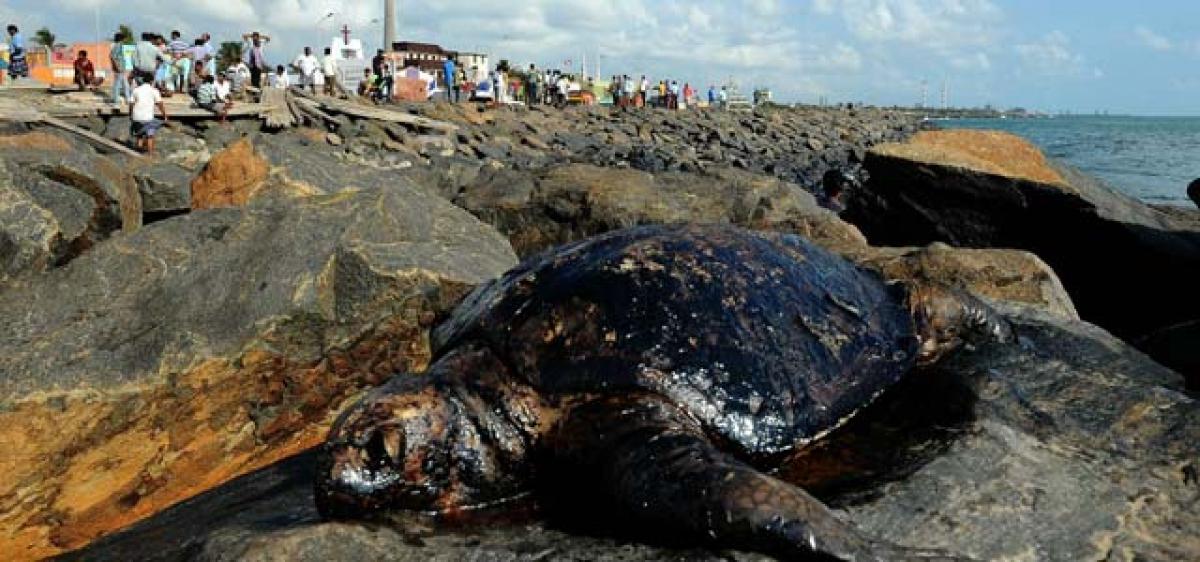Chennai Oil spill- Environment loses to bureaucracy

Environmentalists’ fear the massive oil spill after two ships collided near Chennai on January 28 2017; will have a long-term impact on the marine life than previously believed.
Environmentalists’ fear the massive oil spill after two ships collided near Chennai on January 28 2017; will have a long-term impact on the marine life than previously believed.
The collision took place around 4am on Saturday when MT BW Maple - a ship from the Isle of Man that was on its way out of the Ennore port - hit MT Dawn Kanchipuram, an Indian ship carrying nearly 45,000 tonnes of petroleum. MT Dawn Kanchipuram was on its way to berth at the Ennore port, 24 km north of Tamil Nadu capital.
The Coast Guard said on Tuesday nearly 40 tonnes of oil sludge and 27 tonnes of oil and water mixture has been collected. The thick oil sludge washed ashore along 800m of shoreline north of Chennai harbour.
The popular Marina Beach and a 2-3 km stretch of shoreline near Thiruvalluvar have also been affected.
- On January 28 2017, two cargo ships collided off the Ennore coast in Kamarajar Port causing oil to spill into the sea.
- Though the contents of the ship’s cargo- LPG, spirit oil and diesel remained intact, the engine oil leaked out of the damaged ship.
- This Spill has caused pollution along the beach as well as threat to marine life.
- Due to wave action and the southern current, the spill spread some 34 km in the ocean.
- It has been already three weeks post the disaster which has exposed the lacuna in the State’s disaster recovery mechanism, lack of transparency and coordination. However, many volunteers helped to clean the beach of oil spill.
The poor response
- After the accident, KPL delayed action and the response was utterly inadequate. There was no information about the spill in the public domain.
- Despite whatever the probe reports say, had response mechanisms swung into action, the oil spill could have been contained.
- On the contrary, Kamarajar Port officials issued a press release stating that “there is no damage to the environment like oil pollution and no casualty or injury to persons.”
- This led to loss of precious time in cleaning the oil spill. In addition to it, they did not even reveal the actual quantity of oil spill leading to miscalculations in covering the area to contain the oil spill.
- The authorities should have acted immediately to contain the disaster — not act immediately to contain the damage to their reputations when a disaster happens.
Environmental damage
- The marine life along Ennore coast has been disastrously affected.
- Bunker oil is heavy oil. With weight and density, it will become like a tar ball, and sink to the sea bottom and settle on the sea bed. This will restrict the oxygen supply to marine life. Once fishes come into contact with the oil, their respiratory system will get affected and they will die.
- In addition to fishes, Olive Ridley turtles nest along the coast in Chennai, and also from Ennore to Pulicat are now facing threats. While the biggest dangers turtles face are from trawling nests — the oil spill is likely to cause major problems too.
- Turtles need to come up to the surface to breathe while in the sea. Sometimes, they ingest surface water while taking in air. The present water contains toxic oil which hey will ingest, ultimately leading to their death.
- The surface oil will be carried by currents and it will get deposited on floating seaweed. Young turtles live in the seaweed, which act as a shelter for them. Hatchlings are also known to swallow little particles in the water.
- While some news reports talk of bioremediation being carried out by experts, the sludge is reported to have a heavy concentration of nine heavy materials such as zinc, lead and arsenic which are non-biodegradable and cannot be removed by bioremediation.
- These will remain in the ecosystem for the foreseeable future, poisoning marine life all the way up the food chain and causing irreparable damage to humans as well as to the marine ecosystem.
- What is unexpected is that the oil spill has spread till Mamallapuram, about 60 km south of Ennore. It is also now reported that the slick has spread to Cuddalore in the south, will soon reach the Pichavaram mangroves and then northwards to affect the Pulicat mangroves.
Effects of oil spill:
- Upto two-thirds of an oil-spill can evaporate in the first few days, but before the light, toxic compounds evaporate, they kill fish and animal life and pose harm to future generations.
- The thick oil also washes ashore creating reservoirs on the beaches of toxic chemicals that can have a lasting effect on the environment.
- The immediate impact of an oil slick is the mass death of fish and turtles and of birds because they cannot fly with wings coated by heavy oil.
- Because the oil forms a film on the surface, it reduces the amount of light and oxygen passing into the water. This suffocates marine life.
- The oil destabilises the entire marine food chain, beginning with plankton, microscopic organisms that live in ocean depths, being deprived of the sunlight they need to make food. The death of plankton means death for marine animals that feed on them and so on up the food chain to humans.
- Toxic chemicals leached from the oil and some of the oil itself sink to the seabed, damaging coral reefs and endangering the fish.
- The shore lines and sandy beaches in coastal areas may also be an indirect victim of oil water pollution. The oil contaminated water is usually swept across the shoreline by the waves in high tides. This makes the beaches dirty and unsafe for the human population as well. Thus, coastal areas are continuously contaminated due to oil pollution.
- Oil pollution seriously degrades the water quality on a long-term basis. Being insoluble in water, oily water always exists as bi-layer. Also, at the shore lines, the current of waves might even turn the oily water into a turbid oil water emulsion (wherein the oil and water exist as a single turbid phase due to constant mechanical mixing forces). This degrades the quality of water further.
- Tourism industry is greatly affected by oil spills and oil pollution. Due to increasing oil pollution on beaches and shorelines, recreational activities of tourists like boating, swimming, diving, adventure sports are taking a back seat. Unclean and unhealthy water will repel tourists from undertaking these activities completely.
How to prevent and control oil spills?
- Quality cannot be compromised when it comes to ships and oil tankers in marine waters. Their mechanical parts and equipment need to pass strict quality checks to be proven safe against any oil spill hazards. Extra attention is required while installing the pipes in tankers. Any probable leakage issue should be eliminated before it sets out on the sea.
- Government of all countries worldwide should treat oil pollution seriously and come up with a suitable disaster management plan to deal with this problem. Local environmental agencies should also step up their action plans towards the recovery of polluted water bodies. A plan should be developed to direct the restoration process and incorporate things like coral and plantation reconstruction, shoreline improvements and transport restrictions across water bodies.
- Bioremediation can also be used. When bacteria are used to clean up oil spills in the marine environment, it is termed as bioremediation. Bioremediation is a process that uses natural decomposers and plant enzymes to treat the contaminated water.
- Regular skimmers need to be employed in marine water to monitor and control oil spills. Skimmers are boats that help scoop the spilled oil from the surface of the polluted water. This way immediate action can be taken in case of accidents to avoid long-term damage in serious proportions.
- The government should have a 24/7 emergency team ready for any marine accidents and oil spill incidents. An effective team will facilitate immediate clean up of the mess that any such incidents might cause.
- Several laws and regulations have been operational since long in most of the countries, but still oil pollution has been on the rise. The laws should be implemented on ground level and facilities should be checked regularly for proper maintenance and documentation of their procedures for discharge as well as loading. Also, mock drills should be mandatory for all vessels, so as to be prepared to clean up oil spills in emergency situations.
- The oil spills in the water bodies can be cleaned up the chemical way. Using sorbents (big sponges which absorb oil) oil spills can be cleaned. Also, chemical dispersants effectively break down oil into its corresponding chemical constituents.
- Physical methods can also be employed for cleaning oil spills. Vacuum trucks can suck up spilled oil from the beaches and the surface of water. Oil spills in beaches may also contaminate ocean water. So, shovels and road machinery can be used to clean up oil on the beach. Oil contaminated sand and gravel can be picked up and moved away, so that the waves hitting the shores do not pick up the oily residues to cause oil water pollution. Floating barriers called ‘booms’ can also be used to prevent oil pollution. This is usually done by planting a large boom around a leaking oil tanker to collect it before it causes massive water contamination.
Livelihood hurt
- Loss in fish catch and polluted fishes has led to loss of livelihood of the fishermen.
- Due to the oil spill, nobody has gone out to fish. Labourers who are dependent on the fish trade, who used to make Rs. 400-500 a day, are hardly making Rs. 50.
- This has created problems for the family to survive. In a response to it, children might be expected to work to meet ends.
NGT Judgment
- In a Landmark NGT judgement — Samir Mehta vs the Union of India — in the aftermath of the sinking of MV Rak off the Mumbai coast, it was observed that “an oil spill has significant negative impacts on marine ecology, particularly on the aquatic community.
- Impact of immediate nature includes the mortality of different animal species, both microscopic and macroscopic invertebrates like molluscs, arthropods, echinoderms, etc. and vertebrates, especially fish.
- Long-term impact includes changes in the community structure caused mainly by changes in physiological and biological behaviour of different species in the community due to differential impact of the oil spill.”
Administrative responsibility
- The Ministry of Defence promulgated the National Oil Spill Disaster Contingency Plan in 1996.
- The Indian Coast Guard has been demanding, for over 20 years now a State contingency plan from States. Despite all States being asked to come up with a contingency plan, only a few have complied, as there seems to be no compulsion or obligation to submit a plan.
- Recently, the Tamil Nadu State Coastal Zone Management Authority requested all the Port Trusts to prepare a Comprehensive Oil Spill Management Plan to detect the oil spill for their areas since none of the Ports have a Comprehensive Oil Spill Management Plan, which is in consonance with the National Oil Spill Disaster Contingency Plan of the Ministry of Shipping and Surface Transport, Government of India
- In fact, many of the officers involved in the clean-up operation and the whole oil spill privately admitted that this was the first time they were dealing with such a problem. While it was a learning exercise for them, it also exposed the lack of preparedness to deal with oil spills.
- Still many questions remain unanswered such as how much oil has actually been spilled into the sea when initial claim was just one to two tones; the Coast Guard put the figure at more than 20 tonnes and a report on the investigation to find out who was at fault and what action needs to be taken. This will still take considerable time though.
- There should be transparency about disaster-related information, especially details regarding the current status of the spill, or precautions the public needs to take which ought to have been widely disseminated by any responsible administration.
Health hazards
- Many people, who were involved in the clean-up operations, reported skin allergies and minor injuries.
- The skin allergies were due to the oil, while the minor injuries were from volunteers slipping on the oil-coated rocks.
- Bunker oil is more toxic than crude oil. It has heavy hydrocarbons, polycyclic aeromatic hydrocarbons – these are toxic compounds and could have an adverse impact on health. It is carcinogenic
- The volunteers have also complained of breathing problems.
- It was more worrying that there was lack of adequate safety equipment provided to those in the clean-up operations.
- Thus, the negligence of owners and authorities led to difficulties faced by humans and animals alike for no fault of theirs.
Views
- The oil spill is destroying marine life, livelihoods and causing permanent damage to biodiversity.
- The massive ramifications of the act have been sidelined by the state as well as media to focus more on the political developments happening in state. This shows the cruel irony which allowed responsible to escape attention and accountability.
- Instead of authorities announcing that the spill containment work has been almost completed, they should be truthful in their work and allow containment and damage control until the damage is contained.
- The public needs to know how much damage has occurred, where and whether the damage continues, the safety precautions to be taken and till when.
- Transparency in work and sharing of information honestly is the very least that the public expects from its governments. The guilty must be brought to books and culpable owners/crew should be severely penalized.
- It must ultimately be ensured that the polluters pay an exemplary price for their mistake.
- Ordinary citizens have the power to move the government with their concerted and determined effort as seen in Chennai recently and this is the right cause for which citizens have to come together and force accountability and action from the authorities.
Expected Questions
- How does oil spill affect the biodiversity? Enumerate certain oil spill incidences of world in past which affected significantly to marine and human life.
Environment General Studies 3
- Disaster and disaster management.
- Conservation, environmental pollution and degradation, environmental impact assessment














